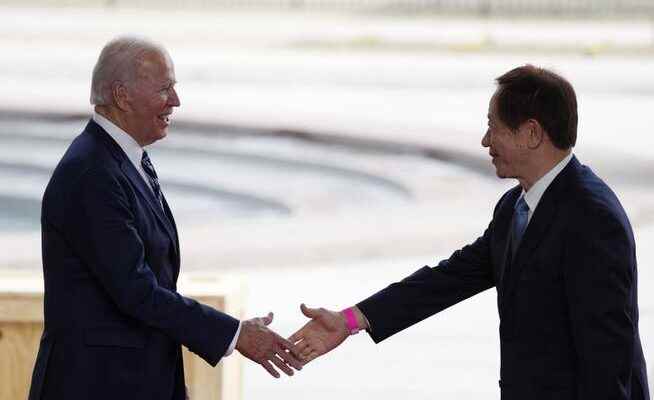US President Joe Biden’s industrial policy is paying off. The world’s largest contract manufacturer of chips wants to export modern production technology to the USA.
A handshake for the history books: TSMC’s Board of Directors Chairman Mark Liu (right) welcomed US President Joe Biden to the Taiwanese semiconductor giant’s newest chip factory in the US state of Arizona on Tuesday.
US President Joe Biden records another success of his industrial policy. The world’s largest contract manufacturer of chips Taiwan Semiconductor Manufacturing (TSMC) wants to triple its investments in the USA to 40 billion dollars. The group announced this on Tuesday at a ceremony in its first chip factory in the US state of Arizona.
With the additional capital, a second state-of-the-art chip plant is to be built by 2026, which will then produce chips with structures as small as 3 nanometers. As transistors get smaller, they can do more with less power. These semiconductors are therefore particularly important for mobile high-tech such as smartphones.
With the announcement, Apple’s most important chip supplier is strengthening its commitment in the USA. The $12 billion plant, where the construction of the first production facilities was celebrated on Tuesday in Biden’s presence, is scheduled to produce 4-nanometer chips from 2024, which will be used in Apple’s current top model, the iPhone 14, for example.
«Globalization is as good as dead and so is free trade»
TSMC founder Morris Chang
The Taiwanese are thus reacting to the growing pressure from the US government on domestic and foreign companies, which are increasingly producing chips and other key products such as batteries and electric cars in the US and not exporting them. In a speech at the celebrations, he underlined his ambitions of his “Chips and Science Act”, with which the government wants to attract chip manufacturers through a 53 billion program and keep rival China at bay.
US President Biden swears by the success of his industrial policy
By relocating jobs, the US share of global chip production has fallen from 30 percent to 10 percent, Biden said. The USA is the world leader in research and development of new chip technologies. “But where is it written that America can’t lead the world in manufacturing again?” the US President asked rhetorically. “We’re proving we can.”
This year, Biden made it clear who he sees as opponents and allies in this project. He threatened companies with severe penalties that would continue to supply modern chips to China. Especially in export-oriented countries such as Germany, Japan and South Korea, this fuels concern that parts of the economy could decouple from their important trading partner China. At the same time, with his “Chip 4” alliance, Biden is ensnaring the major chip powers Japan, South Korea and Taiwan to cooperate more closely with the USA.
The mixture of threats of punishment and financial help works. South Korea’s memory chip giant Samsung is investing $17 billion in a plant in Texas, while the domestic manufacturer Intel is investing $40 billion in factories in Arizona and Ohio. Japan’s government, in turn, has agreed with the American government to jointly develop production technology for 2-nanometer chips.
TSMC doesn’t want to be left out either, as the group gets most of its chip designs and sales from the USA. Chairman of the Board Mark Liu emphasized in a press release that his company is now establishing the most environmentally friendly and advanced semiconductor production facility in the USA. “We are grateful for the continued collaboration that has brought us here and look forward to working with our partners in the United States to serve as a base for semiconductor innovation.”
Taiwan’s capitulation to the great power conflict between the USA and China
However, not everyone shares this joy in Liu’s homeland. Taiwan’s economy and people have become accustomed to being an irreplaceable part of the global supply chain. But that’s exactly what customers around the world fear. Because China is threatening an invasion to bring the island off its coast home to the Middle Kingdom.
In that case, the West would lose its most important chip supplier. Europe and Japan are therefore also subsidizing the US in competition to attract factories from TSMC and other chip manufacturers. Japan has even had success. Together with Sony and the automotive supplier Denso, the Taiwanese are building a factory for seven billion dollars.
TSMC founder Morris Chang had criticized this relocation of production from TSMC’s previous bastion Taiwan as inefficient. Because the ever smaller structures require ever larger investments in ever larger factories in order to keep unit costs low.
Distributing production therefore threatens to increase chip prices for customers. And in Taiwan there is a growing concern that the country’s own location will be weakened by emigration.
Opposition Kuomintag MP Lee Kuei-min asked in Parliament last month, “TSMC is seen as a silicon shield and an important pillar of Taiwan’s strength. What will happen when it pulls most of its production out of Taiwan?”
In the meantime, however, TSCM founder Chang has apparently capitulated in the face of the great power conflict. “Globalization is as good as dead and so is free trade,” he said at a news conference in Arizona on Tuesday. “A lot of people still want them to come back, but I don’t think they will.”
